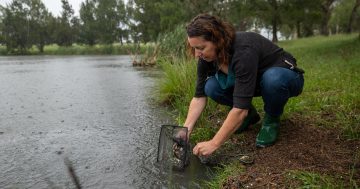
Environment Minister Rebecca Vassarotti: review is necessary to ensure the ACT Offsets Policy remains current and effective. Photo: Ian Bushnell.
The way in which ACT developers can compensate for any environmental destruction they cause is in for a shake-up. It will mirror moves at the federal level to reform a system found to be not working and actually contributing to environmental decline.
The ACT Government has hired NSW consultant Rooftop Social to review the Territory’s environmental offsets policy to determine what improvements are required to make it more effective, and to prepare the ACT for expected changes to national offset arrangements.
The ACT’s Offsets Policy reflects federal environmental laws but also takes into account ACT protected matters, such as ACT listed species or ecological communities that may not be of national significance but are locally important.
Problems with offset systems, where a developer may trade off the removal of trees with plantings elsewhere or the destruction of an endangered species habitat with similar land elsewhere, have been rife and open to rorting.
The Federal Government’s Nature Positive Plan: better for the environment, better for business released in December, a response to Graeme Samuel’s critical 2020 review of the EPBC Act, states offset arrangements do not require outcomes that are better for the environment overall.
In fact, it states many offsets deliver no benefit at all as they involve ‘protection’ of areas that would not have been cleared and they are not maintained long-term.
“At the same time, offset requirements are difficult to comply with, cause delays and impose significant, unproductive costs on proponents,” it states.
Governments have also been found to rarely enforce offset conditions.
An ACT government spokesperson did not detail offset problems in the Territory but said the government shared the Commonwealth’s identification of “limitations and challenges” with national offset arrangements.
Nor would the spokesperson elaborate on the issues listed in the contract that the consultant would investigate – policy gaps, data and transparency, funding, governance, legislated responsibilities and resourcing, and risk exposure.
“The minister has determined that a review is necessary to ensuring the ACT Offsets Policy remains current and effective in delivering the core national environmental goal of ensuring there are no new extinctions,” the spokesperson said.
The government spokesperson said ongoing pressures on land availability to support a growing population was a key issue and offset requirements would be needed to be carefully considered and planned.
“The review seeks to find a balance between such competing interests, while ensuring environmental offsets deliver a net positive outcome for our threatened species and ecological communities,” the spokesperson said.
Under the new national offset arrangements, the trade-off against harm will no longer continue unless it can be demonstrated that the habitat is under clear and imminent threat.
Proponents will need to first demonstrate attempts to avoid and mitigate harm before resorting to environmental offsets, reversing what had been found to be developers’ first option.
They will also need to deliver a net gain for the threatened plants or animals.
Proponents are also likely to face higher costs with the Federal Government wanting to send a price signal to developers as an incentive to do the right thing and to promote compliance.
Where the lack of a suitable offset is holding up a development, proponents will be able to make a conservation payment based on the cost of like-for-like habitat restoration and management, as well as a premium to ensure an overall environmental benefit.
The ACT Government spokesperson said a report was due in the second half of 2023, which would advise Environment Minister Rebecca Vassarotti on the reform priorities and recommend how to achieve better environmental outcomes through offsetting.
The 2021-22 ACT Budget provided $283,000 to progress strategic offsets matters, the development of the offsets register, and policy review.
The review contract is worth $133,000.





















